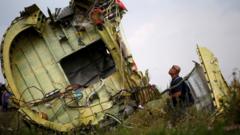The Nigerian Joint Admissions and Matriculation Board (JAMB) has acknowledged severe technical malfunctions during this year’s university entrance examinations, leading to widespread student dissatisfaction and tragic consequences, including a candidate's suicide.
Examinations Crisis in Nigeria: Technical Glitches and Tragic Consequences

Examinations Crisis in Nigeria: Technical Glitches and Tragic Consequences
Technical issues haunt Nigerian university-entrance exams as a tragic event leads to national outrage.
Amid outrage from students, families, and the public, JAMB admitted that a "technical glitch" compromised the results for many of this year’s examinations, as less than 20% of candidates managed to achieve the necessary scores to gain university admission. The exams, crucial for prospective university students, have come under scrutiny after nearly 80% of candidates scored below the required 50% threshold, igniting a wave of anger and frustration throughout Nigeria.
The distress surrounding the examination process reached a tragic peak with the confirmed suicide of 19-year-old Faith Opesusi Timileyin, who reportedly took her life following disappointing results. Timileyin's family revealed that she had attempted the test twice, scoring lower on her second attempt, which she found unbearable. "The pain made her take her own life," her father lamented, illuminating the severe mental stress students face amid educational pressures.
Technical failures plagued the examination day experience as well; students reported that substantial portions of the exam, including up to ten questions, failed to display on their screens. One student shared her frustrations about logging in to find someone else’s exam profile, while another recounted wasted time due to system malfunctions.
In a tearful admission, JAMB's registrar, Ishaq Oloyede, publicly apologized for the "painful damage" caused, announcing that nearly 380,000 candidates from 157 affected centers would have the opportunity to retake their exams. He attributed the failures to an unusual computer system malfunction during the critical days of testing.
As calls for accountability reverberate across social media, opposition figures and activists have not held back their criticism of the exam body's management, suggesting that systemic incompetence and educational sabotage have led to dire consequences for students. The incident raises pressing questions regarding the integrity of Nigeria's educational framework, as citizens demand changes and improvements to ensure that future generations are spared such distressing experiences.
The situation continues to develop, with stakeholders urging reforms and greater support for affected students, as this year's examination crisis exposes deeper issues within Nigeria's educational system.
The distress surrounding the examination process reached a tragic peak with the confirmed suicide of 19-year-old Faith Opesusi Timileyin, who reportedly took her life following disappointing results. Timileyin's family revealed that she had attempted the test twice, scoring lower on her second attempt, which she found unbearable. "The pain made her take her own life," her father lamented, illuminating the severe mental stress students face amid educational pressures.
Technical failures plagued the examination day experience as well; students reported that substantial portions of the exam, including up to ten questions, failed to display on their screens. One student shared her frustrations about logging in to find someone else’s exam profile, while another recounted wasted time due to system malfunctions.
In a tearful admission, JAMB's registrar, Ishaq Oloyede, publicly apologized for the "painful damage" caused, announcing that nearly 380,000 candidates from 157 affected centers would have the opportunity to retake their exams. He attributed the failures to an unusual computer system malfunction during the critical days of testing.
As calls for accountability reverberate across social media, opposition figures and activists have not held back their criticism of the exam body's management, suggesting that systemic incompetence and educational sabotage have led to dire consequences for students. The incident raises pressing questions regarding the integrity of Nigeria's educational framework, as citizens demand changes and improvements to ensure that future generations are spared such distressing experiences.
The situation continues to develop, with stakeholders urging reforms and greater support for affected students, as this year's examination crisis exposes deeper issues within Nigeria's educational system.


















